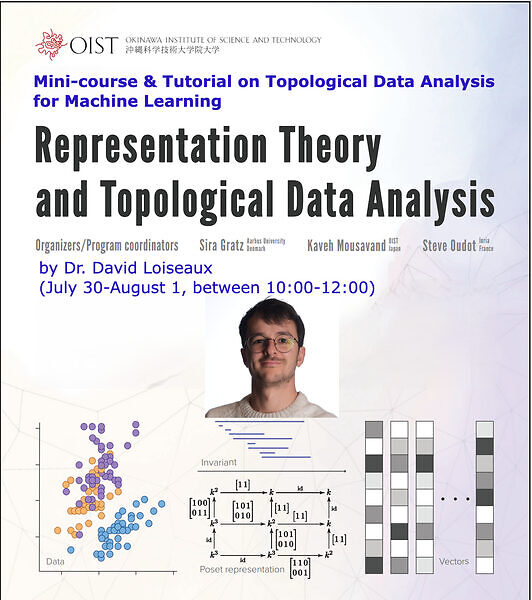Mini-course & Tutorial on Topological Data Analysis for Machine Learning (by Dr. David Loiseaux)

Date
Location
Description
This introductory mini-course & tutorial is offered by an expert in Topological Data Analysis & Machine Learning, as part of the thematic program TDA PARTI: Topological Data Analysis, Persistence And Representation Theory Intertwined (TP25TD).
Location & Time:
Day 1 (July 30th): L4E48 10:00-12:00
Day 2 (July 31st): L5D23 10:00-12:00
Day 3 (August 1st): L5D23 10:00-12:00
This talk will also be broadcast online via Zoom:
Zoom link
Meeting ID: 947 8296 0593
Passcode: 584111
※ Please note that these lecture series will be streamed via Zoom and may be recorded. Upon the consent of the lecturer, the mini-course may be uploaded on the OIST website※
- Topological Data Analysis for Machine Learning (by Dr. David Loiseaux)
This mini-course consists of three lectures, which will be delivered on Wednesday (July 30), Thursday (July 31), and Friday (August 1), between 10:00-12:00 (including a short break in each lecture).
- Miniourse & Tutorials by Dr. David Loiseaux.
Title: Topological Data Analysis for Machine Learning
Abstract: The development of machine learning and data acquisition techniques in the last decade has led to the emergence of large, complex and multimodal datasets. Building good representations for data has therefore become a central challenge. Topological Data Analysis (TDA) provides concise, mathematically grounded methods derived from algebra and topology to effectively tackle this challenge for various geometrical data types, ranging from point clouds to time series to medical images.
I will start this minicourse by introducing some notions of TDA (invariants derived from algebra and topology, and their properties) and how to compute them in a few practical applications (tutorial). I will then present a Machine Learning (ML) framework, in which we can use topological invariants of a given dataset as Machine Learning features. I will then showcase the use of these topological invariants as features or data representations in a Machine Learning framework, with unique stability properties and inherent invariance and genericity. This will allow us to build topology-aware ML pipelines and solve practical standard inference problems such as classification or regression. Finally, I will explain how to enhance these pipelines in two separate directions: 1. to capture richer topological information from data using multiparameter persistence, and 2. to optimize or learn the topological representation of the data for a given task by suitable building a differential framework.
Subscribe to the OIST Calendar: Right-click to download, then open in your calendar application.



